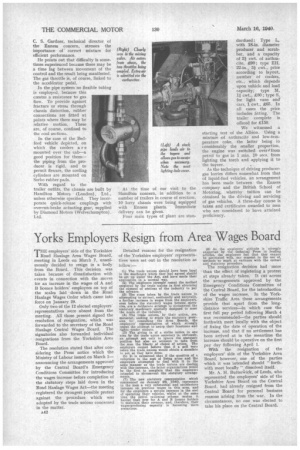Yorks Employers Resign from Area Wages Board
Page 44

If you've noticed an error in this article please click here to report it so we can fix it.
THE employers' side of the Yorkshire Road Haulage Area Wages Board, meeting in Leeds on March 7, unanimously decided to resign in a body from the Board. This decision was taken because of dissatisfaction with events in connection with the moves for an increase in the wages of A and B licence holders' employees on top of the scales laid down in the Road Haulage Wages Order which came into force on January 29.
Only two of the 12 elected employers' representatives were absent from the meeting. All those present signed the resolution of resignation, which was forwarded to the secretary of the Road Haulage Central Wages Board. The signatories also forwarded individual resignations from the Yorkshire Area Board.
The resolution stated that after considering the Press notice which the Ministry of Labour issued on March 1— announcing the arrangements approved by the Central Board's Emergency Conditions Committee for introducing the wages increase before completion of the statutory steps laid down in the Road Haulage Wages Act—the meeting registered the strongest possible protest against the procedure which was adopted by the trade unions concerned in the matter.
A42 Detailed reasons for the resignation of the Yorkshire employers' representatives were set out in the resolution as follow:—
Ill The trade unions should have been loyal to the machinery which they had agreed /amid be set up wader the Act, and have made their application in a normal way.
(2) The employers strongly resent the method employed by the trade unions in first obtaining the consent of sections of the industry to pay the advance.
(3) The steps taken by the trade unions in attempting to extract, sectionally and naturally, a further increase in Wages from the employers, even before the statutory wages became operative, are a deliberate attempt to circumvent the statutory machinery specially designed to meet the needs of the industry. (4) The trade unions, by their action, are, moreover, seeking to evade the statutory provision for consulting the Area Boa-rda, the employers representatives of which strongly resent the attempt to usurp their functions and rights -under statute. (5) The giving in of a strike notice in one area by the trade union secretary •is, obvionelY, an attempt not only to ignore the statutory position but also an attempt to take hoot the men the liberty of choice of action. The employers cannot believe that if a poll were taken the trade unions would obtain • mandate to sot as they have done. (6) lt is submitted that if the question of a reduction in the soot of living &rote and the employers attempted to deal with it in the same manner as the trade onions are dealing with this increase, the latter organizations would be the first to complain that the employers intended to circumvent the statutory arrangements.
(7) The new statutory remuneration which commenced on January 29, 1940, represents to the men a very subatantial and satisfactory increase on previous wages in this area, and for the employers a serious increase in the cost of operating their vehicles, whilst at the same time the petrol rationing scheme makes it harder than ever far A and B licence holders to maintain their revenue, and therefore, their
wages-producing capacity is becoming, more precarious. (8) As the ernployer;' attitude is strongly supported by the technical Press in leading articles, the employers feel that they cannot be associated with, nor consent to the use of, methods -so ranch at variance with the correct and statutory procedure. The resignation decision had more than the effect of registering a protest at steps already taken. It cut across the arrangements approved by the Emergency Conditions Committee of the Central Board, for the introduction of the wages increase. In the Yorkshire Traffic Area these arrangements provide that apart from the longdistance services—in which case the first full pay period following March 4 was recommended—the parties should forthwith meet locally with the object of fixing the date of operation of the increase, and that if no settlement has been arrived at in the meantime the increase should be operative on the first pay day following April 1. With the resignation of the employers' side of the Yorkshire Area Board, however, one of the parties which it was intended should "forthwith meet locally ".dissolved itself.
Mr. A. H. Butterwick, of Leeds, who represented the employers' side of the Yorkshire Area Board on the Central Board, had already resigned from the Central Board for personal business reasons arising from the war. In the circumstances, no one was elected to take his place on the Central Board.




































































